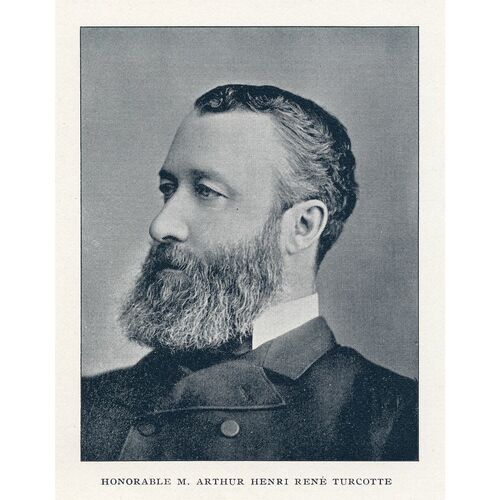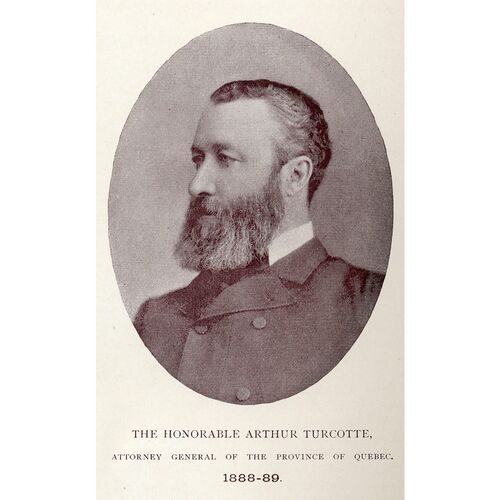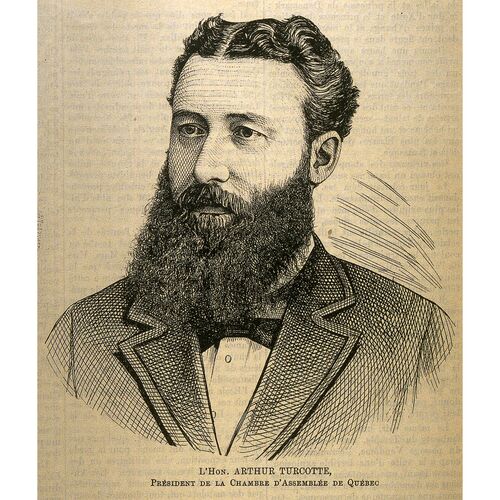TURCOTTE, ARTHUR (baptized Arthur-Henri-René), lawyer, journalist, politician, and office holder; b. 19 Jan. 1845 in Montreal, son of Joseph-Édouard Turcotte*, a lawyer and politician, and Flore Buteau; m. 16 Jan. 1873 Éléonore MacDonald in Trois-Rivières, Que., and they had four children; d. 12 Oct. 1905 in Montreal and was buried four days later in Trois-Rivières.
Arthur Turcotte studied with the Jesuits, first at Collège Sainte-Marie in Montreal and then at the prestigious Stonyhurst College in England. Following his return to Canada, he began law in the fall of 1863 at the Université Laval and finished at McGill College. After his articling, he was called to the bar on 18 June 1867. He moved to Trois-Rivières and by 1871 was in practice with Charles Dumoulin and Magloire McLeod. He was appointed qc on 5 Dec. 1878.
Turcotte had become a member of the Trois-Rivières municipal council on 7 July 1873. The construction of a water-main was the first issue he took up as a councillor, and he presided over the completion of this project during his term as mayor, 17 July 1876 to 9 July 1877.
He quickly developed an interest in provincial politics. In a by-election on 18 April 1876 he had been elected for Trois-Rivières as an independent Conservative. From the very beginning he kept his distance from the Conservatives, mainly because of their policies on railways and taxation. The attorney general, Auguste-Réal Angers*, introduced a number of highly unpopular measures which made municipalities pay their share in the construction of the Quebec, Montreal, Ottawa and Occidental Railway. Turcotte voted against these proposals, believing them to be unfair and arbitrary. In the 1878 election he was returned by acclamation. For the only time in the parliamentary history of the province, the new assembly was evenly split, with 32 members supporting Liberal premier Henri-Gustave Joly, 32 backing Conservative Joseph-Adolphe Chapleau*, and one independent – Turcotte.
The session opened on 4 June 1878. The two parties stood face to face, confronting the question of who was to form the government – Chapleau or Joly. It was customary for the assembly to elect the speaker before the speech from the throne. Joly nominated Turcotte to avoid naming one of his own party and thereby being reduced to a minority. Chapleau protested against this “act of corruption of the worst kind”: the member for Trois-Rivières had been elected as a Conservative. The nomination was put to a vote, and the result was 32 opposed and 32 in favour. Turcotte had to cast the deciding vote – and was elected by a majority of one. This procedure broke with the tradition that the selection of a speaker had to be unanimous. Turcotte justified his action by declaring that “the two parties are not divided on [matters of] principle.” Conservative circles, especially the ultramontanists, and the Conservative press cried treason. “It is now an accomplished fact,” opined Le Journal des Trois-Rivières, that “M. Turcotte, the member for Trois-Rivières, has betrayed his constituents, betrayed his party, and sullied his name forever.” His opponents accused him of having “surrendered his party’s flag to the enemy.”
Turcotte occupied the speaker’s chair from 4 June 1878 to 8 March 1882. During the six-week session of 1878, a number of his rulings were challenged. All the bills introduced by the Joly government passed narrowly, and each time it was Turcotte’s vote that saved it. The following year, through by-elections, the government obtained a slim majority of four. In October 1879 Joly had to yield power to Chapleau, but Turcotte retained his office. He evidently performed his task well, for both the premier and the leader of the opposition praised the impartiality and fairness of his rulings.
In the 1881 election Turcotte made a clean break with the Conservatives and ran as a Liberal. He was defeated by 51 votes, but his opponent, Sévère Dumoulin, was accused of bribery and lost the seat. In the new election held on 26 March 1884 Turcotte won. He was re-elected two years later despite Conservative efforts.
On 29 Jan. 1887 Turcotte was appointed minister without portfolio in the cabinet of Honoré Mercier*. That year he was acting commissioner of the Crown Lands Department in the absence of Pierre Garneau. In November he presided over cabinet meetings while Mercier was away. He served as attorney general from 8 May 1888 to 22 Aug. 1890 but was defeated in the 1890 election, even though Mercier’s Liberals won in a landslide. Bishop Louis-François Laflèche* reputedly used all his influence to ensure his defeat. Turcotte then withdrew from politics, but he continued to support the Liberals, and on 19 Aug. 1890 Mercier appointed him protonotary for the Superior Court of the District of Montreal.
As an assemblyman and a cabinet minister, Turcotte made a name for himself by his contribution to the civil code and to the improvement of judicial procedures. He was responsible for measures to protect poor or debt-ridden families from seizure of their wages and the necessaries of life. He was also a convinced and vigorous champion of provincial autonomy. As the member for Trois-Rivières, Turcotte did a great deal for his city. In particular, he got it linked with the Quebec, Montreal, Ottawa and Occidental Railway by a belt line that was opened in June 1879. He even proposed that Trois-Rivières be made the provincial capital.
In 1885, during the Métis disturbances in the northwest, Turcotte was the first to introduce a motion in the assembly condemning the federal government’s stand. The motion was supported by Mercier’s Liberals, but was defeated by 41 to 15. During the whole campaign to save Louis Riel* which rocked the province of Quebec, Turcotte took part in various demonstrations and from many platforms defended the Métis movement.
Turcotte was interested in journalism as well as in politics. During the 1872 session he had been parliamentary correspondent at the Legislative Assembly for Le Canadien, the Quebec newspaper of which Hector-Louis Langevin was political director. This brief stay at Quebec gave him a rare opportunity to immerse himself in political life. Later, when he was president of the Compagnie d’Imprimerie de Trois-Rivières, he became founding editor of La Concorde, which began publication on 2 May 1879. This paper reflected Turcotte’s own development and his intention to remain above party politics. Its motto was, “The country’s interests before party interests.” A vehicle for Turcotte’s views, it preached harmony and understanding; when he supported the Joly government, so did the paper. His objective was to rally the moderates of all parties around the Liberal administration.
As long as the Liberals were in power, the paper managed to balance its budget, probably through government largesse. Supported by Le Clairon, it fought against such Conservative papers as Le Journal des Trois-Rivières, the organ of the ultramontanist wing of the party, and Le Constitutionnel, the voice of the moderate wing. The return of the Conservatives to power in Ottawa and Quebec sounded the death-knell of La Concorde. Financial difficulties multiplied and it ceased publication on 2 May 1884. Its disappearance left the Liberals at Trois-Rivières without a vehicle. On 2 August Turcotte and other Liberal organizers launched La Sentinelle, which carried on the tradition of L’Avenir and Le Pays. It drew fire from Bishop Laflèche, who banned it in 1886, but instead of disappearing, the newspaper changed its name and owner.
Turcotte died suddenly while working in his library at the Montreal court-house on 12 Oct. 1905, a few months after the death of his wife. His remains were taken to Trois-Rivières. When the casket arrived, hundreds of townspeople came to pay their last respects to a figure whom Le Soleil (Québec) had described as “the most popular man in the city and district of Trois-Rivières.”
There are many testimonials to the fine qualities of Arthur Turcotte. He was spoken of as a highly cultured man and a brilliant orator. François-Maximilien Bibaud* observed, “M. Turcotte has an expressive face and pleasant and distinguished ways. He could not pass unnoticed in any gathering. His voice is pleasing and well modulated.” Others praised his wit, his geniality, his good manners, and his intelligence. Montreal’s La Presse in some measure summed up the comments made about him at his death. “His gentle nature, his lofty intelligence, his cultivated mind will remain graven in the memories of everyone who had an opportunity to appreciate him as a citizen and a friend.” Undoubtedly Turcotte had the courage of his convictions in changing parties at a time when political lines were firmly drawn. A book published a few years before he died identified him as “a man who has known all the trials and unpleasantness of the political fray in Canada.” It required character to hold out against such an imposing personality as Bishop Laflèche. It required courage to suffer blows and not be afraid of making enemies. That Trois-Rivières, the stronghold of ultramontanism, was represented in parliament by a Conservative turned Liberal is hard to imagine. Of final importance, Turcotte on many occasions ardently championed the cause of French-speaking people, not only of his own province, but also of the rest of Canada.
AC, Trois-Rivières, Qué., État civil, Catholiques, Immaculée-Conception (Trois-Rivières), 16 oct. 1905. ANQ-M, CE1-51, 22 janv. 1845. ANQ-MBF, CE1-48, 16 janv. 1873. Arch. de la Ville de Trois-Rivières, Procès-verbaux du conseil municipal, 1873–76. NA, MG 30, D1, 29: 391–92. Le Clairon (Trois-Rivières), 10 janv.-11 juill. 1884. La Concorde (Trois-Rivières), 2 mai 1879–2 mai 1884. Le Constitutionnel (Trois-Rivières), 1876–84. L’Étoile du Nord, 19 oct. 1905. L’Événement, 6, 13, 17 oct. 1905. Le Journal des Trois-Rivières, 1876–91. Le Monde illustré (Montréal), 21 mai 1887, 6 sept. 1890. Montreal Daily Herald, 13 Oct. 1905. Le Patriote (Sorel, Qué.), 19 janv. 1888. La Presse, 13–14, 16 oct. 1905. La Sentinelle (Trois-Rivières), 1884–87. Le Soleil, 18 avril, 5, 13, 16–17 oct. 1905; 5 oct. 1918. Le Sud (Sorel), 13 janv. 1888. L.-A. Bélisle, Références biographiques, Canada – Québec (5v., Montréal, 1978), 5. F.-M. Bibaud, Le panthéon canadien; choix de biographies, Adèle et Victoria Bibaud, édit. (nouv. éd., Montréal, 1891). Borthwick, Hist. and biog. gazetteer. Canadian biog. dict. CPG, 1889. Cyclopædia of Canadian biog. (Rose and Charlesworth). J. Desjardins, Guide parl. Dominion annual reg., 1878, 1884. Alain Gamelin et al., Trois-Rivières illustrée (Trois-Rivières, 1984). J. Hamelin et al., La presse québécoise. M. Hamelin, Premières années du parlementarisme québécois. René Hardy et al., La Mauricie et les Bois-Francs; inventaire bibliographique, 1760–1975 (Montréal, 1977). J.-J. Lefebvre, Le Canada, l’Amérique: géographie, histoire (éd. rév., Montréal, 1968). Montréal fin-de-siècle; histoire de la métropole du Canada au dix-neuvième siècle (Montréal, 1899). Qué., Assemblée Législative, Débats, 1877–80, 1884; Journaux, 1878–79; Report of the clerk of the crown in chancery, on the general elections of 1878 (Quebec, 1878); . . . 1881 (1882); . . . 1886 (1887); Royal commission . . . to make enquiry into different matters and things, concerning the good government of this province . . . , Notes and proceedings and evidence of witnesses (Quebec, 1892). Quebec Official Gazette, 23 Aug. 1890: 1898. RPQ. Robert Rumilly, Hist. de la prov. de Québec, vols.2, 4–6; Mercier et son temps; Mgr Laflèche et son temps (Montréal, [1938]). Nive Voisine, Louis-François Laflèche, deuxième évêque de Trois-Rivières (1v. paru, Saint-Hyacinthe, Qué., 1980– ).
Cite This Article
Jocelyn Saint-Pierre, “TURCOTTE, ARTHUR (baptized Arthur-Henri-René),” in Dictionary of Canadian Biography, vol. 13, University of Toronto/Université Laval, 2003–, accessed March 1, 2026, https://www.biographi.ca/en/bio/turcotte_arthur_13E.html.
The citation above shows the format for footnotes and endnotes according to the Chicago manual of style (16th edition). Information to be used in other citation formats:
| Permalink: | https://www.biographi.ca/en/bio/turcotte_arthur_13E.html |
| Author of Article: | Jocelyn Saint-Pierre |
| Title of Article: | TURCOTTE, ARTHUR (baptized Arthur-Henri-René) |
| Publication Name: | Dictionary of Canadian Biography, vol. 13 |
| Publisher: | University of Toronto/Université Laval |
| Year of publication: | 1994 |
| Year of revision: | 1994 |
| Access Date: | March 1, 2026 |


![Honorable M. Arthur Henri René Turcotte [image fixe] Original title: Honorable M. Arthur Henri René Turcotte [image fixe]](/bioimages/w600.6473.jpg)



